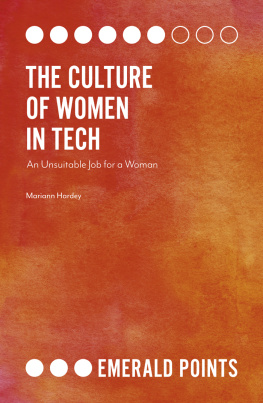Elissa Shevinsky - Lean Out: The Struggle for Gender Equality in Tech and Start-Up Culture
Here you can read online Elissa Shevinsky - Lean Out: The Struggle for Gender Equality in Tech and Start-Up Culture full text of the book (entire story) in english for free. Download pdf and epub, get meaning, cover and reviews about this ebook. year: 2015, genre: Romance novel. Description of the work, (preface) as well as reviews are available. Best literature library LitArk.com created for fans of good reading and offers a wide selection of genres:
Romance novel
Science fiction
Adventure
Detective
Science
History
Home and family
Prose
Art
Politics
Computer
Non-fiction
Religion
Business
Children
Humor
Choose a favorite category and find really read worthwhile books. Enjoy immersion in the world of imagination, feel the emotions of the characters or learn something new for yourself, make an fascinating discovery.

- Book:Lean Out: The Struggle for Gender Equality in Tech and Start-Up Culture
- Author:
- Genre:
- Year:2015
- Rating:4 / 5
- Favourites:Add to favourites
- Your mark:
- 80
- 1
- 2
- 3
- 4
- 5
Lean Out: The Struggle for Gender Equality in Tech and Start-Up Culture: summary, description and annotation
We offer to read an annotation, description, summary or preface (depends on what the author of the book "Lean Out: The Struggle for Gender Equality in Tech and Start-Up Culture" wrote himself). If you haven't found the necessary information about the book — write in the comments, we will try to find it.
Elissa Shevinsky: author's other books
Who wrote Lean Out: The Struggle for Gender Equality in Tech and Start-Up Culture? Find out the surname, the name of the author of the book and a list of all author's works by series.
Lean Out: The Struggle for Gender Equality in Tech and Start-Up Culture — read online for free the complete book (whole text) full work
Below is the text of the book, divided by pages. System saving the place of the last page read, allows you to conveniently read the book "Lean Out: The Struggle for Gender Equality in Tech and Start-Up Culture" online for free, without having to search again every time where you left off. Put a bookmark, and you can go to the page where you finished reading at any time.
Font size:
Interval:
Bookmark:
The disruptive and forward-thinking tech industry is fifty years behind the rest of America with respect to the values it holds and the people it represents. LEAN OUT collects the stories of people who fought GamerGate, from women and transgender artists who have made their own games, from women who have started their own companies, from women who have worked for some of the most successful corporations in America, from LGBTQ women, from women of color, to transgender people and people who do not ascribe to a gender. By turns a brutal examination of the power politics of the 21st century elite and an inclusive manifesto for a new way forward, LEAN OUT is crucial reading for those of us in the industry, as well as its critics.
INCLUDING ESSAYS BY:
anna anthropy | Krys Freeman | Leanne Pittsford |
Leigh Alexander | Gesche Haas | Brook Shelley |
Sunny Allen | Ash Huang | Elissa Shevinsky |
Lauren Bacon | Erica Joy | Erica Swallow |
Katherine Cross | Jenni Lee | and |
Dom DeGuzman | Katy Levinson | Squinky |
FAKEGRIMLOCK | Melanie Moore |
Elissa Shevinsky, aka #LADYBOSS, is a serial entrepreneur known for her work building cyber-security applications as well as her unique perspective on women in tech.

2015 by the various authors
The Other Side of Diversity is licensed under a Creative Commons Attribution-NoDerivatives 4.0 International License, and reproduced here with the authors permission
Published by OR Books, New York and London
Visit our website at www.orbooks.com
All rights information:
All rights reserved. No part of this book may be reproduced or transmitted in any form or by any means, electronic or mechanical, including photocopy, recording, or any information storage retrieval system, without permission in writing from the publisher, except brief passages for review purposes.
First printing 2015
Cataloging-in-Publication data is available from the Library of Congress.
A catalog record for this book is available from the British Library.
ISBN 978-1-939293-86-2 paperback
ISBN 978-1-939293-87-9 e-book
Text design by Bathcat Ltd. Typeset by AarkMany Media, Chennai, India.
I love to see a young girl go out and grab the world by
the lapels. Lifes a bitch. Youve got to go out and kick ass.
Maya Angelou
Silicon Valley has risen to mainstream importanceand so has its gender problem. White male subcultures have come to dominate the landscape of startups and blue chip tech companies. The success of men like Apple co-founder Steve Jobs and Facebook CEO Mark Zuckerberg created the perception that ideal founders of companies look just like they didyoung, white, male, and socially awkward.
This myth of the nerdy male founder has been perpetuated by men who found this story favorable. Paul Graham, one of Silicon Valleys most influential investors, said in an interview in 2014:
God knows what you would do to get 13-year-old girls interested in computers We cant make these women look at the world through hacker eyes and start Facebook because they havent been hacking for the past 10 years.
John Doerr, a partner at the Venture Capital firm Kleiner Perkins, sang the praises of the legendary young white male nerd at the National Venture Capital Associations annual meeting in 2008:
In the early days when you went back in the Amazon shipping area, the books were lined up so you could see what people were buying. Invariably there was a book about programming language like Java, and in the same sales order there was a book like The Joy of Sex. These [customers] were probably very clearly male, nerds who had no social or sex lives trying to get help by using an online service.
That correlates more with any other success factor that Ive seen in the worlds greatest entrepreneurs. If you look at Bezos, or [Netscape Communications Corp. founder] Marc Andreessen, [Yahoo Inc. co-founder] David Filo, the founders of Google, they all seem to be white, male, nerds whove dropped out of Harvard or Stanford and they absolutely have no social life. So when I see that pattern coming inwhich was true of Googleit was very easy to decide to invest.
Things may be getting better for women and minorities in tech but the damage that has been done is substantial. The pattern recognition in favor of young white male nerds is deeply ingrained.
The worst part about this myth is that it is blatantly untrue. Jobs and Zuckerberg did not build their companies by themselves. Women played irreplaceable roles at Apple and at Facebook. Photographs and documentary records of the early days at those companies show women as critical parts of the founding teams. Their stories have been carefully erased by men like Zuckerberg and Jobs, who are both widely acknowledged to be masterful story tellers.
Even the New York Times, in a June 2012 article on gender issues in Silicon Valley proclaimed that the Internet was built by men. Pulitzer Prizewinning journalist David Streitfeld wrote MEN invented the Internet. And not just any men. Men with pocket protectors. Men who idolized Mr. Spock and cried when Steve Jobs died. Nerds. Geeks. Give them their due.
Despite his impressive credentials, Streitfeld was not correct. Men did not build the Internet, at least not without women. Judith Estrin was one of the key designers of TCP/IP, which is one of the main building blocks (protocols, to be precise) for communicating information over the Internet. Radia Perlman invented STP, critical for modern networking. Perlmans contribution was significant enough that she has been called the Mother of the Internet. Perlman resisted this title, saying The Internet was not invented by any individual. She also noted There are lots of people who like to take credit for it, and it drives them crazy when anyone other than them seems to want credit, so it seems best to just stay out of their way.
The list goes on. Glenda Schroeder made the first command-line, and also authored one of the earliest research papers proposing a method for creating electronic mail (e-mail) back in the nineteen sixties. Sandra Lerner co-founded Cisco Systems, and co-designed the first Cisco router. Nicola Pellow wrote the first cross-platform web browser, which made the web accessible to consumers, beyond its original limited applications in military and academia.
And of course, lets not forget Ada Lovelace. Ada is widely acknowledged to be the founder of scientific computingor programming, as we call it today. Yes, the very first programmer was a woman.
Women were essential to the development of programming, computing, and the Internet itself. Unfortunately, they werent the loudest about it and so they have been all but erased from our narrative of who gets to lay claim to technology and its culture.
This kind of erasure persists today. Whitney Wolfe sued her cofounders at Tinder for sexual discrimination/harassmentand for their efforts to erase her from the company history. According to the lawsuit, Tinder CMO Justin Matteen said Facebook and Snapchat doesnt have girl founders, it just makes it look like Tinder was some accident. Wolfe and Tinder settled out of court, but it is now widely acknowledged that she was a founder, prior to her departure from the company.
Font size:
Interval:
Bookmark:
Similar books «Lean Out: The Struggle for Gender Equality in Tech and Start-Up Culture»
Look at similar books to Lean Out: The Struggle for Gender Equality in Tech and Start-Up Culture. We have selected literature similar in name and meaning in the hope of providing readers with more options to find new, interesting, not yet read works.
Discussion, reviews of the book Lean Out: The Struggle for Gender Equality in Tech and Start-Up Culture and just readers' own opinions. Leave your comments, write what you think about the work, its meaning or the main characters. Specify what exactly you liked and what you didn't like, and why you think so.








